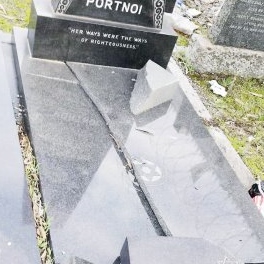
SA

Fourth case of grave vandalism in six months
TALI FEINBERG
The graves vandalised in Somerset West and Strand belonged to Esther Allan, Fanny Spitz and Sheina Malka Portnoi. “I’m absolutely devastated,” says Blanche Portnoi, the late Sheina Malka’s daughter, who still lives in the Strand with her sister Elaine.
“The grave has been there for 50 years and this has really hit me hard. I’m speechless. But we just have to carry on.”
Susan Shapiro, who lives in San Diego, told the SA Jewish Report that Esther Allan was her husband’s maternal grandmother.
“I don’t know what to say about how we feel other than ‘vandalised’,” she said regarding the destruction of the gravestone.
“In many cases, there are no Jews in those towns,” said Shapiro. “My mother’s family is from Uitenhage, and there are no Jews left there to take care of the cemetery.”
For this reason, she believes it’s vital to have a country communities department dedicated to caring for these cemeteries.
“Esther Allen still has two living children, one in Cape Town, and one in Australia, and grandchildren and great grandchildren all over the world, Shapiro said.
“It’s hard to imagine that it wasn’t an act of anti-Semitism because we are so sensitive to the subject. I’m sure it’s upsetting to everyone, especially those of us who are overseas and rely on the community to take care of our history. It’s really hard, and hits home when it’s family.”
The Strand and Somerset West Jewish community has opened a case with the South African Police Service. Both the Cape South African Jewish Board of Deputies and Country Communities Rabbi Moshe Silberhaft believe it wasn’t a case of anti-Semitism but vandalism, because cemeteries are becoming places of antisocial behaviour.
“The problem with our cemeteries is that most of them are surrounded by brick walls. This means homeless people can live in the cemeteries, and even if they are chased out, they usually return,” said Silberhaft.
These people often drink alcohol and consume drugs, which means they may knock over a tombstone intentionally or unintentionally. “The stones weigh up to a ton, but they are only held upright by a pin and some cement, so they are very easy to knock over,” said Silberhaft.
In December last year, 39 graves in the Wellington Jewish cemetery were knocked over, an incident which the Cape board did describe as anti-Semitic, as only the Jewish section was targeted.
In May this year, a plaque was knocked off a wall of the Worcester Jewish cemetery, and in early June, a grave was dug into in Robertson. The Cape board viewed these two acts as vandalism without any anti-Semitic intent.
Silberhaft’s country communities department is working across the country to combat these problems by erecting concrete palisade fencing around cemeteries so that it is easy to see into them, and by laying all tombstones flat. “All new burials should have flat tombstones,” said the rabbi.
Cape Board Director Stuart Diamond concurred that these instances were caused by people living in the cemeteries, and that it was a problem in all burial grounds, not just Jewish ones.
“Cemeteries in general are quiet places that people can go into. A lot of country communities are now investigating hiring security at night. I have taken it up again with provincial government and local municipalities, and hope to meet them.
“We’ve created a cemetery vandalism WhatsApp group so country communities are talking to each other. The Community Security Organisation is on that group,” Diamond said. “We’re looking at ways and means to keep in contact, and find solutions to this problem. It’s greatly upsetting, especially if it’s your family member’s final resting place.”




